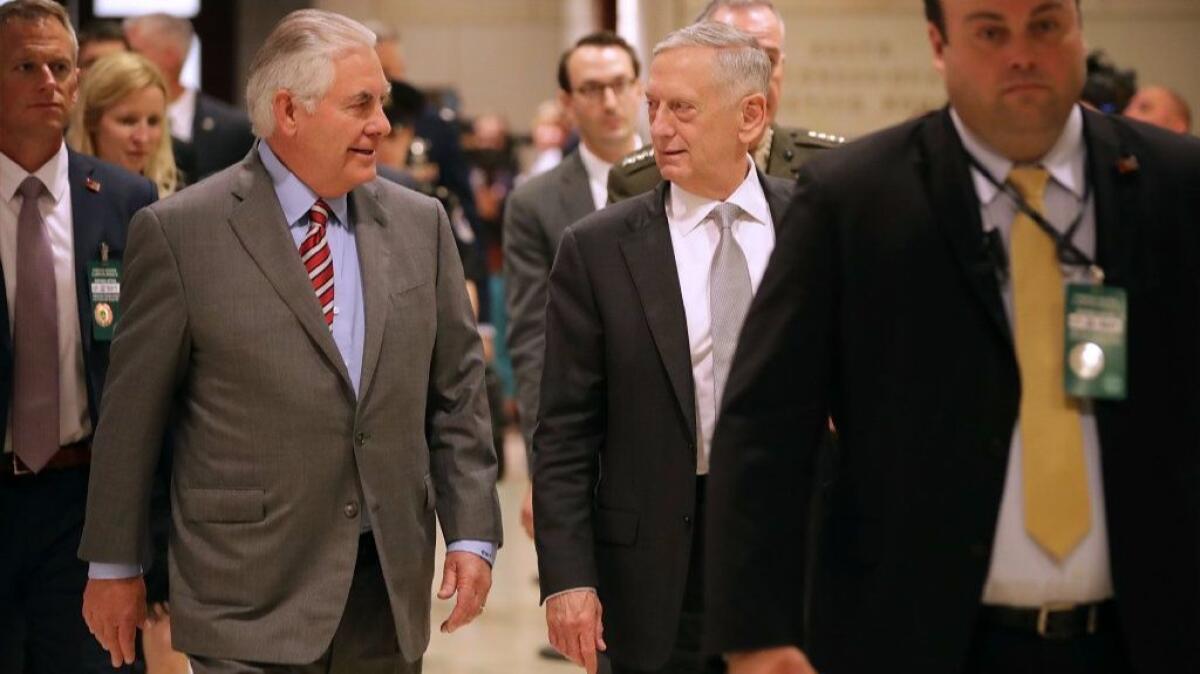House approval of Russia sanctions bill is a rebuke to Trump

Reporting from Washington — The overwhelming vote Tuesday by the GOP-controlled House to impose new Russia sanctions sends a strong and defiant message to President Trump — all the more remarkable because it came from his own party.
The 419-3 vote not only bucked a tradition of leaving foreign policy matters to the president, it marked the most significant example to date of the current Republican Congress standing up to its often unpredictable and disruptive standard-bearer.
The new bill orders up a regimen of tougher sanctions in reprisal for Russia’s meddling in the 2016 U.S. elections. More importantly, it prevents Trump from unilaterally easing the punitive measures, something he has hinted he might do.
Congress “is uncomfortable with any rapprochement with Moscow without getting some things for it,” Rep. Adam Kinzinger (R-Ill.) said ahead of the vote. “We’re sending a message to Moscow. But if the president had any intention of trying to give Vladimir Putin what he wants on certain areas, I think he’ll think twice about it.”
A similar bill was approved earlier by the Senate on a 98-2 vote. Tuesday’s House version wrapped in sanctions against North Korea, so it must return to the Senate, where it is expected to pass. The bill also includes sanctions against Iran, making it harder for Trump to veto, should he be so inclined.
Several foreign policy professionals said they normally oppose congressionally mandated sanctions because they are harder to unwind, and interfere with the smooth and intricate flow of international diplomacy.
But they said Trump’s unorthodox approaches and his apparent affinity for Putin, the Russian president, have given sufficient cause for Congress to act on its own.
“It is not unusual that Congress wants to tie a president’s hands, but it is highly unusual that the president’s own party is tying his hands,” said Jeffrey Mankoff, a Russia scholar at the Center for Strategic and International Studies and former advisor on Russia to the State Department. “It tells me that there is a lot of suspicion about Trump, his family and ties to Russia.”
It tells me that there is a lot of suspicion about Trump, his family and ties to Russia.
— Jeffrey Mankoff, Russia scholar at the Center for Strategic and International Studies
Trump has repeatedly cast doubt on U.S. intelligence conclusions that Russia meddled in the 2016 campaign, has spoken glowingly about Putin and, at least publicly, did not use the recent meeting of the Group of 20 major economies to rebuke the Russian president for his apparent misdeeds.
“This is a show of extreme discomfort, from a Republican Congress to a Republican president,” said Richard Nephew, a research scholar at Columbia University’s Center on Global Energy Policy.
Traditionally, foreign policy experts, historians and a number of the United States’ allies abroad have been loath to see Congress step into matters of international diplomacy. The single voice of a chief executive can respond in immediate and decisive ways that the 535 voices of the U.S. Congress cannot.
And when sanctions against a country or entities in other countries are enshrined in U.S. law, it takes another law to undo them.
In 1974, over the objections of President Ford, Congress voted unanimously to punish the Soviet Union with trade sanctions and embargoes in response to human rights abuses, particularly its refusal to allow Jewish citizens to emigrate. Eventually, under President Mikhail Gorbachev in the late 1980s, Soviet Jews did begin to leave in large waves.
The Soviet Union fell in 1991, and yet the law, known as the Jackson-Vanik amendment, remained on the books until 2012.
Diplomats say it was a constant irritant in negotiations over the years with the Russians, who found it condescending, not to mention outdated and unnecessary.
In a curious twist, the Jackson-Vanik amendment was repealed as part of the so-called Magnitsky Act signed by President Obama, which normalized trade but also punished several individuals connected to the death in prison of lawyer Sergei Magnitsky. That act prompted Putin to suspend U.S. adoptions of Russian children, an issue cited somewhat improbably by some of Trump’s advisors as the motive for their meetings with Russians during the election campaign.
There have been a few other instances in which Congress has tied the president’s hands. In the 1996 Helms-Burton Act, Congress imposed a harsh trade embargo on Cuba, in part in response to Cuba’s shooting down of two small airplanes from a Miami-based anti-Castro humanitarian organization.
Yet as relations between Havana and Washington improved, and Obama in 2014 renewed diplomatic ties, he could not lift the embargo because it was congressionally mandated. Cuban leaders argue the embargo has crippled the island’s economy, and it remains the single greatest point of contention between the two countries. A small handful of Congress members refuse to repeal it.
Similarly, one problem with the new Russia sanctions, Mankoff said, will be that — as with the Jackson-Vanick amendment — they will outlive the Trump administration and constrain future presidents.
Elsewhere in Trump’s administration, others have also shown ambivalence toward sanctions. Secretary of State Rex Tillerson has said he thought sanctions sometimes hurt U.S. businesses. Just this month, Exxon Mobil was fined $2 million for violating Ukraine-related sanctions by signing new deals with Russia’s blacklisted state oil company in 2014, when Tillerson was Exxon’s CEO.
“We would ask for the flexibility to turn the heat up when we need to but also to ensure that we have the ability to maintain a constructive dialogue,” Tillerson argued before the House Foreign Affairs Committee in June.
A spokeswoman for Tillerson, Heather Nauert, could not say Tuesday whether that remained the secretary’s position with the House version of the sanctions bill.
It is debatable how much effect ongoing sanctions have had on Russia. The U.S. and the European Union imposed measures following Putin’s aggression in Ukraine and annexation of Crimea in 2014. The Russian economy has suffered, but at least as much from falling oil prices and other external factors.
New sanctions could hurt, however, especially as Russia attempts to attract foreign investment for the next generation of energy projects where costly exploration missions will be needed to tap into new oilfields.
Europe, meanwhile, is also less than thrilled about the new round of sanctions, especially because European leaders were not consulted.
Led by Germany, several European countries say they are worried that they will be caught up in the punitive measures as they attempt to do business with Russia involving a new proposed gas pipeline, the Nord Stream 2 project. It would supply much of Western Europe with Russian gas.
For more on international affairs, follow @TracyKWilkinson on Twitter
ALSO
U.S. threatens more sanctions on Venezuela
After Trump reluctantly certifies Iran is obeying nuclear deal, he slaps it with new sanctions
Trump did discuss sanctions with Putin despite the president’s earlier denial, White House says
More to Read
Sign up for Essential California
The most important California stories and recommendations in your inbox every morning.
You may occasionally receive promotional content from the Los Angeles Times.











